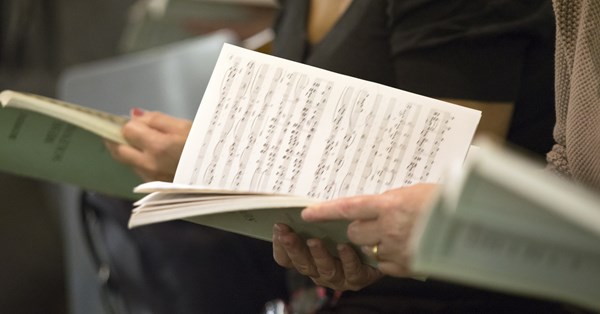WHAT if our departed loved ones are not truly gone, but are closer than we think? How can we mourn those whom we have lost while still moving forward?
In 2005, the poet Charles Anthony Silvestri’s beloved wife, Julie, died after a long battle with ovarian cancer. It wasn’t until a decade later that he was able to express his grief in a poem reflecting on birth, death, and eternity. Leaving this by accident, or fate, on the piano of a close friend, the composer Eric Whitacre, he sparked a creative journey that resulted in a profoundly moving choral work, The Sacred Veil, an exploration of Silvestri’s own story, but also a universal meditation on grief and loss. It had its première in Los Angeles in 2019, and was performed in St Martin-in-the-Fields, London, recently.
The work sets 12 poems by the poet, Whitacre, and Julie herself for choir, piano, and cello, here sensitively played by James Longford and Benjamin Hughes. On one level, it is an intellectually sophisticated piece, dominated by threes. Middle C represents the “veil”, from where Julie’s three-note theme rises a minor third, to E flat, and falls again. Whitacre repeats texts and phrases three times when he wants to meditate on an idea, and movements are internally connected and enriched with quotations from the two artists’ other works.
The listener, however, can leave the cleverness aside and immerse themselves in Silvestri’s journey through his relationship with his wife, the birth of their children, her death, and its aftermath. “The Veil Opens” describes how, at the beginning or end of life, the sacred veil between now and the hereafter “opens slightly up Just long enough for Love to slip silent either in or out”. In “A Dark And Distant Year” the poet, a shy man, adopts a third-person ballad style to tell of their first meeting.
“I’m Afraid” documents the all-too-common awful moment of diagnosis when the world splits into Before and After. “I’m afraid we’ve found something” reappears more loudly each time between a Gregorian-chant recitation of the clinical symptoms, ending in a bare whispered “I’m afraid.” Julie’s theme recurs over and over, a humming motor of anxiety. “Delicious Times” is her own gallant attempt to find humour in her falling hair for the sake of her children. The final, calming “Child Of Wonder” ends the work as it began, with three wordless iterations of the musical material for the opening line “Whenever there is birth or death”.
It was totally absorbing, its shifting textures perfectly performed by the BBC Singers, conducted by the composer. Some audience members wept quietly, I among them.

















